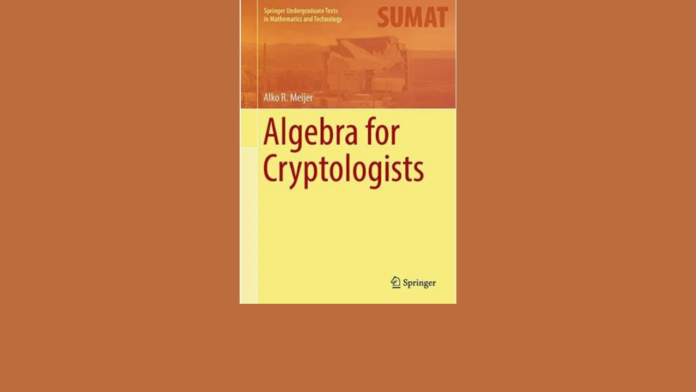In the ever-evolving landscape of technology and digital communication, cryptography has emerged as a fundamental aspect of modern security. Whether you’re safeguarding sensitive personal information or protecting crucial communication channels, understanding the intricacies of cryptography is essential. Alko R. Meijer’s “Algebra for Cryptologists” is a superb introduction to the subject, providing a solid foundation in algebra and its applications to cryptography. With an engaging writing style, Meijer manages to make complex mathematical concepts accessible and relevant to today’s cryptographers.
The book’s structure is methodical, making it an ideal resource for students, professionals, and enthusiasts alike. Meijer begins with an overview of algebraic concepts and their relevance to cryptography, ensuring that readers have a firm grasp of the basics before delving into more advanced topics. The author introduces essential algebraic structures such as groups, rings, and fields, demonstrating how they underpin various cryptographic systems.
Throughout “Algebra for Cryptologists,” Meijer strikes the perfect balance between theory and application, using real-world examples and case studies to illustrate the practical implementation of algebraic concepts. From classical cryptographic systems such as the Caesar cipher to modern techniques like elliptic curve cryptography, Meijer provides comprehensive coverage of various encryption and decryption methods. This approach allows readers to appreciate the theoretical foundations of cryptography while also gaining hands-on experience with practical applications.
One of the standout features of “Algebra for Cryptologists” is the author’s ability to make complex mathematical concepts digestible and engaging for readers. Meijer’s writing style is approachable and clear, ensuring that even those with little prior knowledge of algebra or cryptography can follow the material. The author’s use of analogies and real-world examples helps to demystify the subject, making it more approachable for readers of all backgrounds.
Meijer also provides a wealth of exercises and problems throughout the book, enabling readers to test their understanding and apply their newfound knowledge. These exercises are thoughtfully designed, with varying levels of difficulty to accommodate a range of skill levels. Detailed solutions are provided at the end of the book, allowing readers to check their work and gain further insight into the problem-solving process.
Another notable aspect of “Algebra for Cryptologists” is the inclusion of historical context, which adds depth and relevance to the subject matter. Meijer takes the time to explore the development of cryptography through the ages, touching on its origins in ancient civilizations and its role in various military campaigns and political intrigues. This historical perspective enriches the reader’s understanding of cryptography and highlights the enduring importance of secure communication.
In addition to its comprehensive coverage of algebraic concepts and their applications to cryptography, “Algebra for Cryptologists” also delves into the ethical and legal aspects of the field. Meijer discusses the implications of cryptographic advancements on privacy, surveillance, and the balance of power in the digital age. This discussion adds a valuable layer of context to the technical material, prompting readers to consider the broader implications of their work in cryptography.
Despite its many strengths, “Algebra for Cryptologists” does have a few minor shortcomings. The book assumes a basic understanding of mathematical concepts, which may leave readers with a limited background in mathematics feeling slightly overwhelmed. Additionally, while the author provides a wealth of examples and case studies, some readers may desire more in-depth coverage of certain topics or a more extensive exploration of emerging cryptographic techniques.
Nonetheless, “Algebra for Cryptologists” is an exceptional resource for anyone looking to expand their knowledge of cryptography and its underlying mathematical principles. Meijer’s engaging writing style, comprehensive coverage, and thoughtful exercises make this book a valuable addition to the library of students, professionals, and enthusiasts alike. The historical context and ethical discussions presented throughout the book further enhance the reader’s understanding of the subject matter, making “Algebra for Cryptologists” a well-rounded and informative read.
In conclusion, Alko R. Meijer’s “Algebra for Cryptologists” is an excellent introduction to the fascinating world of cryptography, providing readers with a solid foundation in algebra and its real-world applications. The book’s approachable writing style, comprehensive coverage, and engaging exercises make it a must-read for anyone interested in exploring the mathematical underpinnings of secure communication. While some readers may require additional resources to supplement their understanding of certain topics, “Algebra for Cryptologists” remains an invaluable resource for learning about the intriguing intersection of algebra and cryptography.
Whether you’re a student looking to deepen your understanding of cryptography, a professional seeking to broaden your skillset, or a cryptography enthusiast wanting to explore the subject from a mathematical perspective, “Algebra for Cryptologists” is an indispensable guide. Alko R. Meijer’s expertly crafted book is a testament to the power of algebra in the realm of cryptography and a compelling invitation to unlock the secrets of secure communication.


